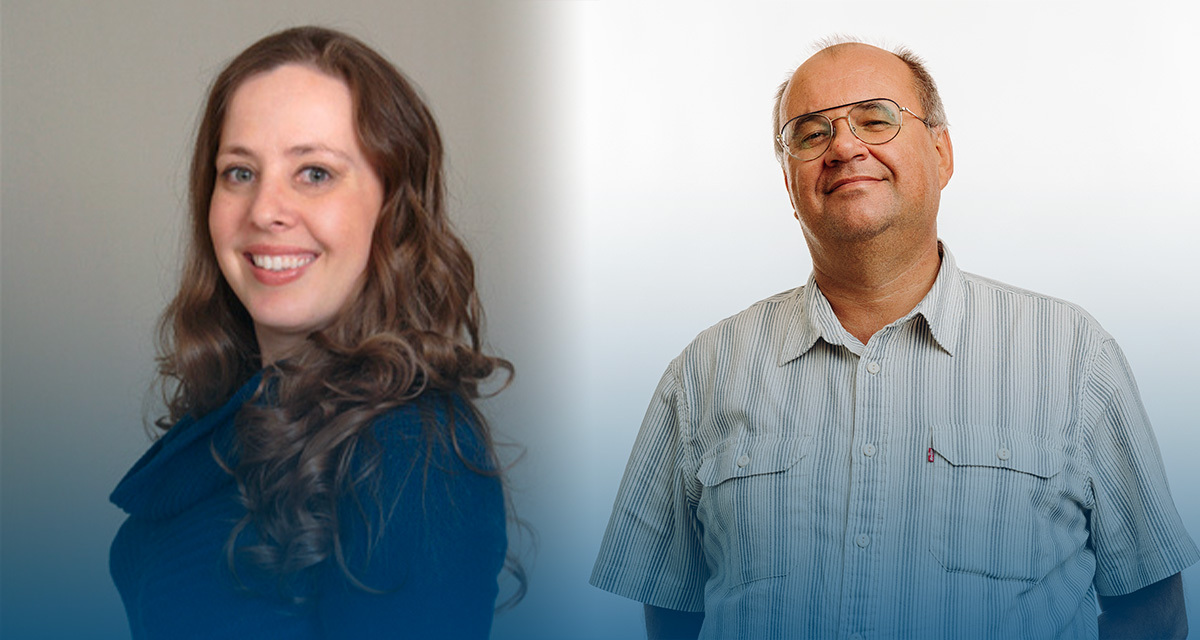Gordon History Made: Dr. Oleksiy Svitelskiy Receives $400K in Fourth NSF Grant Milestone
Winning one National Science Foundation (NSF) grant is a feat many professors would hope to achieve. Winning two or three, even better. But winning four is an impressive accolade, and almost unheard of at small, private colleges. Yet despite the odds, Gordon College’s Dr. Oleksiy Svitelskiy (physics) recently achieved this milestone—and it’s the largest NSF grant Gordon has ever received.
Though all Svitelskiy’s previous grants, totaling $909,000, have been significant wins, this latest grant is perhaps the most ambitious. The additional $400,000 in NSF funding will go toward the research project “RUI: Wave Engineering in 2D Using Hierarchical Nanostructured Dynamical Systems.” The project is a continuation of a collaboration with Dr. Kamil Ekinci, leading researcher at the Ekinci Group at Boston University (BU), an R1 institution like Harvard and MIT. It’s the largest NSF grant Gordon has ever received and the funding will last about three years.
“This research is about creating novel types of materials for what we call acoustic metastructures,” says Svitelskiy. “For example, a symphonic orchestra of many musical instruments playing an elaborate composition is an acoustic metastructure. Such metamaterials are necessary not only for concert halls and sound studios, but also for signal and data processing in electronics. They can even build ‘green houses’ that will not need energy for heating even in the coldest Arctic winter.”
An Unprecedented Research Collaboration
The NSF is an independent federal agency that supports science and engineering across the country. It makes awards to research communities who have identified solution-oriented projects likely to result in significant “advancements for the American people.” Gordon has received 11 NSF awards since 1973.
There are several different types of NSF awards: some are solely for one school to use, while others promote collaboration between institutions. Svitelskiy’s latest grant falls in the latter category, which specifically seeks to connect schools with significant research means to schools who wish to grow their research prowess. R1 schools are the top of this research spectrum, including institutions such as MIT, Harvard and BU.
Svitelskiy has already been collaborating with BU and the Ekinci Group as a result of his previous NSF grants and a long-lasting friendship with Professor Kamil Ekinci. The idea for this grant came as a result of a previous project. Dr. Greg Keller, professor of biology and chair of Gordon’s Department of Life, Health and Physical Sciences, says, “This collaboration with BU [will] continue to yield significant research output, particularly with our physics and engineering students, certainly affecting retention and enrollment at the College.”
Benefits of NSF Programs and Grants
Collaborating with an R1 institution like BU will greatly benefit Gordon, the involved professors and students who participate in the research. Students will have the chance to perform research in a prestigious lab in the Boston area, giving them hands-on experiences that will pave the way for future jobs, internships, research opportunities, graduate school and more.
Dr. Kristen Siaw, an assistant professor of chemistry at Gordon, will be Svitelskiy’s co-primary investigator, marking her first experience on an NSF grant. For Siaw, a more recent member of Gordon’s faculty, having this opportunity early in her tenure will not only allow her to heighten her own research experience, but will also pave the way for future NSF grants and other opportunities in the future. In fact, Dr. Siaw has already begun research with the Ekinci lab as part of her work on a Scholarship & Christianity in Oxford STEM grant, another program designed in part to foster ongoing R1 relationships. This NSF grant is a win for that program as well.
“I am thrilled about receiving this grant because of the amazing opportunities it provides for our undergraduate students,” Siaw says. “This grant allows our students to engage in high-caliber research as undergraduates, which is a rare and exciting opportunity. I am personally excited to further collaborate with Kamil Ekinci from BU, who leads one of the leading research groups on nanometer scale engineering.”
“Grants like these are a win for everyone,” says Dr. Jon Welty Peachey, dean of academic affairs at Gordon. “We hope this is only the beginning of providing opportunities of this scale to our students, faculty and staff.”
 The Bell
The Bell